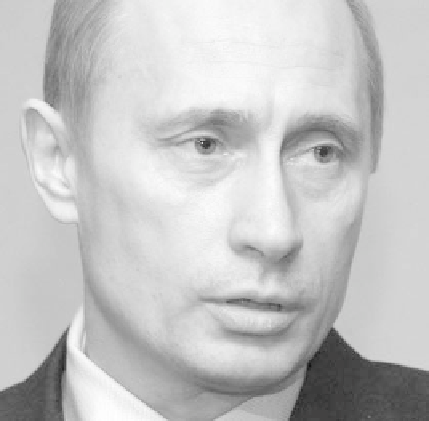Travel Reference
In-Depth Information
Putin, Vladimir Vladimirovich
(1952-
)
president of Russia
The president of the Russian Federation since
2000, Vladimir Putin was born in St. Petersburg,
then known as Leningrad, on October 7, 1952.
His father was a factory foreman. Two brothers
were born before him, but they both died young,
one shortly after birth and the other of diphtheria
during World War II. As an infant, Putin was bap-
tized in the Russian Orthodox Church, despite the
atheist policy of the Soviet government. As a
youth, Putin was a devoted participant in sports,
especially wrestling and judo, and the Russian
form of self-defense known as sambo. After win-
ning the St. Petersburg sambo championships
several times, he attained the title of master of
sports in sambo, and later reached the same title
in judo.
Putin studied law at Leningrad State Univer-
sity, graduating in 1975. He then joined the KGB's
(secret police) foreign intelligence unit, stationed
in Leningrad and East Germany. While stationed
in Dresden, his wife, Liudmila, also a Leningrad
State University graduate and a schoolteacher,
gave birth to their daughters. In 1990, Putin
returned to Leningrad and retired from the KGB
with the rank of colonel. After a short stint as an
aide to the vice president of Leningrad State Uni-
versity, he entered city politics as an aide to Ana-
tolii Sobchak, the liberal mayor of Leningrad,
renamed St. Petersburg in 1991. From 1991 to
1994 he served as the chairman of the commit-
tee for foreign relations of the St. Petersburg
Mayor's Office. In March 1994 he was appointed
deputy mayor, a post he held until Sobchak's
defeat in the 1996 mayoral elections. During
these years Putin had studied for a candidate
degree in economic sciences, which he received
in 1996.
While Putin was out of work in St. Petersburg,
Anatolii Chubais, an influential insider, recom-
mended him for a job in Moscow with President
Boris
YELTSIN
's administration. From 1996 to
1998, Putin served as deputy chief administrator
of the Kremlin, with responsibility for the central
government's relations with Russia's diverse
Vladimir Putin
(North Atlantic Treaty Organization)
regions. In July 1998, he was appointed director
of the Federal Security Bureau (FSB), one of the
newly reorganized security services that replaced
the old KGB. In March 1999, while remaining
director of the FSB, he added another important
portfolio, secretary of the Presidential Security
Council, the advisory body coordinating the
activities of the armed forces, security agencies,
and the police.
Putin's appointment in August 1999 as prime
minister, the fourth in less than a year, surprised
most observers. Another surprise came on Decem-
ber 31, 1999, when Yeltsin resigned ahead of time
and named Putin acting president. In March 2000
Putin was elected to a four-year term the initial
results of which defied easy description. By early
2004 political life had become less chaotic, albeit
less democratic; Yeltsin-era oligarchs had been co-
opted; the war in
CHECHNYA
continued unabated;
terrorism had become evermore present, espe-
cially in Moscow; and Russian coffers benefited
from the country's emergence as a major oil pro-
ducer. In presidential elections of March 2004,
Putin gained easy reelection, garnering more
than 70 percent of the vote.


Search WWH ::

Custom Search